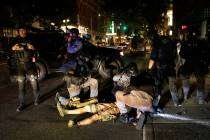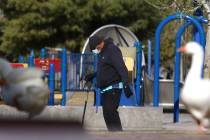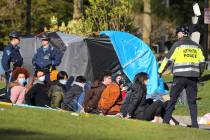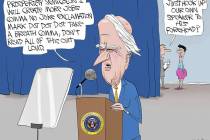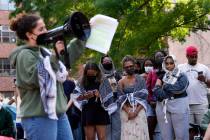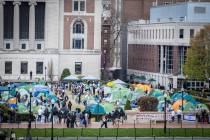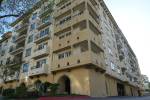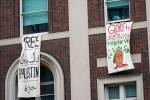Building community
Last week, I wrote about a UNLV survey of area residents that showed an alarming number of them -- 45 percent -- would move out of Las Vegas if they could. Although the difficulty in finding work in this recession-ravaged city surely was a primary factor, the survey indicated the absence of a "sense of belonging" also came into play.
That column elicited a number of interesting responses from readers. One man wrote that Las Vegas is a great place to live for a single person but "now that I have kids of my own, there is no way I want to stay in Las Vegas. I plan to be out of here before my oldest is in middle school." A longtime resident said Las Vegas used to have a strong sense of community but no more: "The remaining pioneers recall the way it was and understand what is different. Change is inevitable and the party is over. Decay and stagnation are everywhere."
But other readers picked up on a different thread in the column. I had interviewed community activist Lisa Mayo DeRiso, who said creating a stronger sense of community is a matter of getting off your butt and making it happen. "The people who say, 'I've lived here and didn't get a sense of community,' they expect the community to come to them," she said. "But the community isn't going to come to you. The future of our community, the breadth and depth of our relationships, is up to us."
Michael Herrera is the embodiment of DeRiso's sentiments. Herrera told me that when he read the column, it resonated with him. "I wasn't surprised by the findings of the UNLV study," he says. "What bugs me is how people can feel that way but do nothing about it."
Herrera says he "felt some detachment at times" after moving to Henderson in the mid-1990s. But when he got married and became a father, he started thinking more seriously about the question of community. "I was doing some reflecting and I asked myself, what kind of community do I want my child to grow up in? With the economic climate and the foreclosure crisis, I saw my neighborhood potentially in limbo, with property values decreasing. I felt compelled to do something."
In early 2009, Herrera created a Neighborhood Watch organization. He knocked on doors on his street and posted signs. About 80 people showed up for the initial meeting. While fighting and deterring crime are important goals, Herrera had bigger ideas. "I was looking for an avenue to get people involved," he says. He and others organized events for the neighborhood kids. For Halloween, they blocked off a street and the neighbors set up tables in their front yards and handed out candy. For Christmas, they hired a Santa, put him on a hayride and drove him through the neighborhood. Kids jumped on the hayride with Santa and received a present to take home. Each month in the spring, summer and fall, a screen and projector are set up in the neighborhood park and parents and kids gather to watch movies and eat popcorn.
Everything is paid for through donations. "I get donations, $20, $10 from neighbors," Herrera says. "When they donate money, they feel they are part of it, they have ownership. I do it on the cheapest, lowest budget. All the events are free."
A Facebook page, with more than 240 members, keeps neighbors informed about upcoming events. The Facebook page also serves as a discussion forum for neighbors. They talk about everything from suspicious activity in the neighborhood to where to find a good plumber. The organization has spawned an offshoot -- a moms club that meets weekly and goes out together once a month while the dads stay home.
The payoff is a safer neighborhood in which the parents know one another and the kids play together. "It's true," Herrera says. "It takes a village to create a culture and to raise kids."
In Herrera's Coventry neighborhood, the homeowners association has been supportive of the neighbors' activities but has played no financial or organizing role. He says he gets the feeling homeowners associations are hesitant to organize activities for residents because of liability issues.
Deservedly proud of what he's accomplished in such a short time, Herrera and his neighbors have shown that creating a stronger sense of community can be done here if people just make the effort. "People need to burn a few calories," he says. "It's our fault if we don't create community. It's just a matter of networking. It's a 'If you build it, they will come' kind of thing."
Building community is easier in some neighborhoods than in others. Some neighborhoods, for example, don't have a park in which to hold events. Other neighborhoods may not have many kids, which often are the impetus to build a safe and caring community.
But if Herrera and his neighbors can do this, so can hundreds of other valley neighborhoods. Las Vegas could shed its reputation for transiency and disconnectedness and all the rest, but it must begin with individuals willing to take the first steps.
Geoff Schumacher (gschumacher@reviewjournal.com) is the Review-Journal's director of community publications. His column appears Friday.








